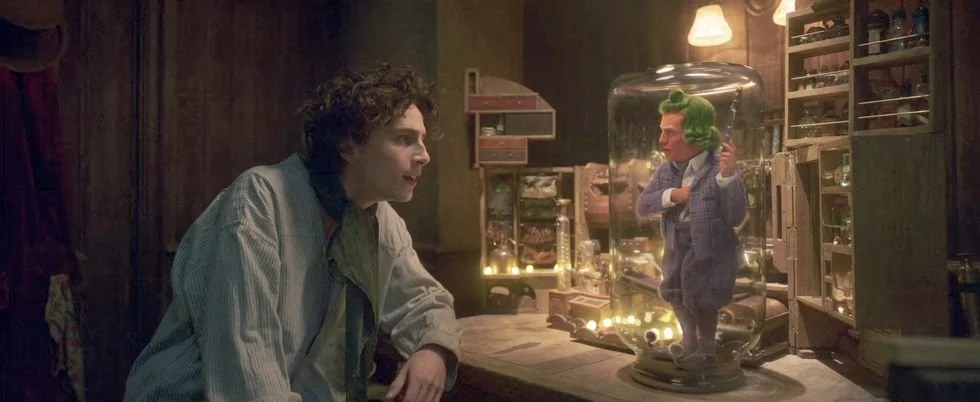BETTER MAN
Directing: B
Acting: B
Writing: B
Cinematography: B+
Editing: B+
Special Effects: B+
Music: B
I’m sure you’re all wondering: does anyone fuck Robbie-Williams-as-chimp in Better Man? Well, not onscreen. Someone gives him a hand job though!
Here’s the most impressive thing about Better Man, though: it has an astonishing ability to make you forget its wackadoodle premise: this is a biopic about British pop superstar Robbie Williams, except Robbie is the singular character rendered as a CGI chimpanzee. It’s a liberalization of two ideas at once: a pop star as a dancing monkey (okay, yes, I know, chimps aren’t monkeys, that’s not the point) and raving addict as an out of control animal. I’m not sure how well the layered metaphors work in the many scenes of Robbie as a child, mind you, detailing his love of his nan who openly accepts him flaws and all. He’s neither dancing nor out of control at that young an age, and all I could think of was how his mother must have reacted when she pushed a chimp through her hoo-ha.
Indeed, I really wondered how a movie like this would tackle sexuality. I’ll certainly give director and co-writer Michael Gracey this much credit: his does indeed write Robbie Williams as a sexual being—under normal circumstances it would make no sense not to—but he does it relatively subtly, only one scene being overtly sexual (the aforementioned hand job, from a fan at a meet and greet), and somehow, it actually works in the context of the narrative. I couldn’t tell you what the secret sauce was that he used, though; this is otherwise a pretty straightforward biopic story.
It’s also a fun one, most of the time. I had a good time. The trailers do not make this clear, but Better Man is also a musical in the classic sense, with Robbie breaking out into song as part of the narrative, in addition to the several we see him perform onstage in concert. Relatively early on there is a truly dazzling sequence, an almost seamless blend of on-camera choreography and blue screen, the camera swirling around Robbie as he moves from indoors to join a massive crowd of synchronized dancers out in the street. A particularly nice touch is when the crowd jumps, but just close enough to doing it at the same time so that their jumps form a quick rave from the front of the crowd to the back. It’s mesmerizing and incredibly entertaining, and I wish Better Man had more sequences like it.
What it does have far too much of is a focus on Robbie Williams’s self-loathing, with constant cutaways to other versions of himself in audiences, reacting back to him with everything from disapproving scowls to outright hateful screaming. This happens a lot, well past the point of it becoming tiresome, until finally in one fantasy sequence he jumps from the stage and engages in combat with them all, to the death. He even seems to kill is inner child, a choice that I could not quite wrap my brain around, aside from it perhaps representing the extremity of his suicidal ideation. I understand what Gracey is going for with this, but it is overwrought and overdone. This is on top of the many scenes we see of him excessively drinking and doing drugs. It seems worth mentioning yet again that it’s a chimp we see doing all these things. A chimp with a British accent—both motion capture and voice performance by English actor Jonno Davies (the voiceover narration and the music vocals are from Williams himself).
Then there’s the issue of the music. It should be noted that Robbie Williams, while a massive star elsewhere in the world, never broke through in the United States, and it’s not difficult to see why. I went to his official YouTube page, played the most-played music video posted there, and then fell asleep.
To be fair, contextualized in the film, Robbie Williams’s music is a lot more fun, though none of it made me eager to download the motion picture soundtrack. Better Man has several musical sequences and interludes that are undeniably infectious, all of them performed by a CGI chimp with a stunning amount of legit charisma, even when being depraved. Robbie Williams as a character in this movie is someone you connect with, you empathize with, and you root for. It’s kind of a stunning surprise, and makes you wonder whether it would even work as well if he were portrayed by a regular human. The plot beats are fairly by the numbers, after all, and the chimp-as-metaphor forces a kind of consideration that it would never manage otherwise.
What an odd, fun, deceptively conventional movie this is, wrapped in a wildly unconventional concept. It’s not nearly as provocative as it clearly wants you to think it is, but it will impress anyway, particularly how deeply expressive Robbie Williams’s CGI chimp face is, using FX technology that barely works but still works well, and at the same time will look dated in five years. Perhaps the same is the case for Better Man as a movie overall, but sometimes you only need a movie to work right now, and right now, this one works surprisingly well.
He’s not a monkey, get it straight!
Overall: B










